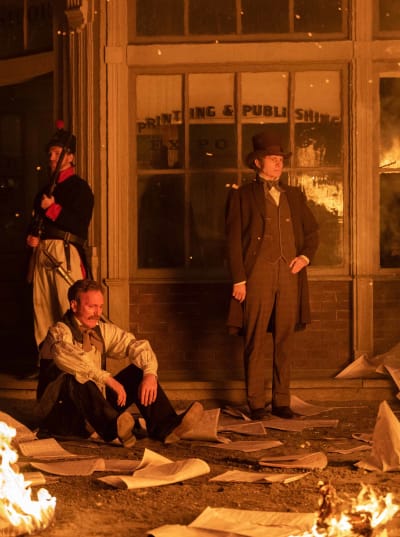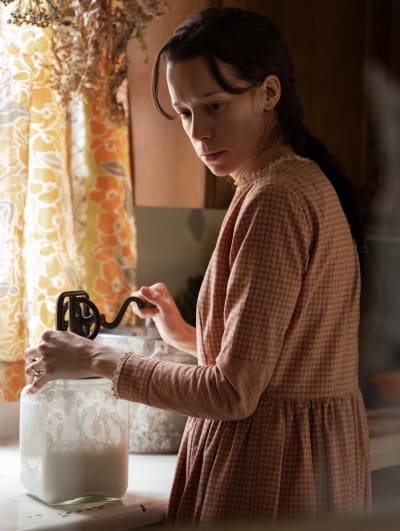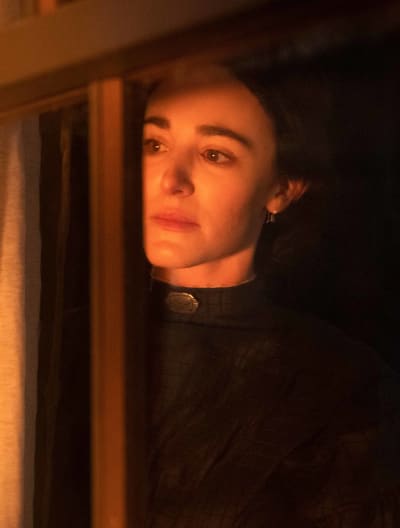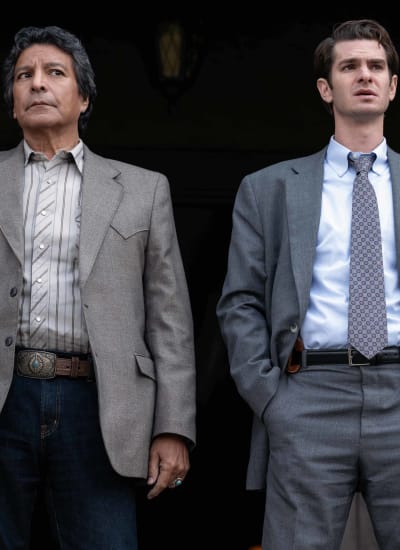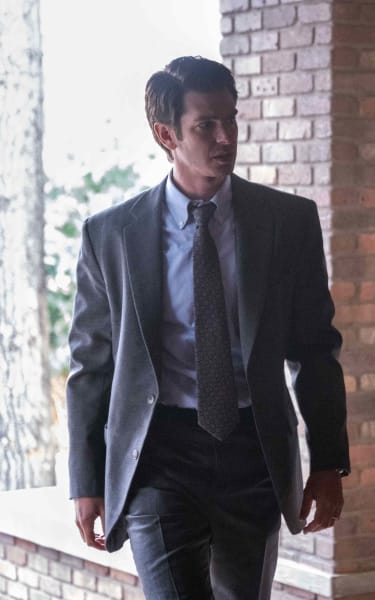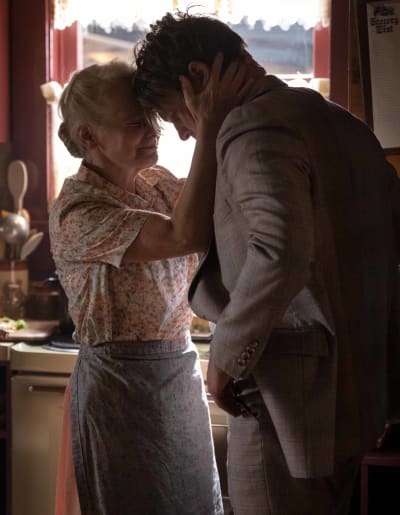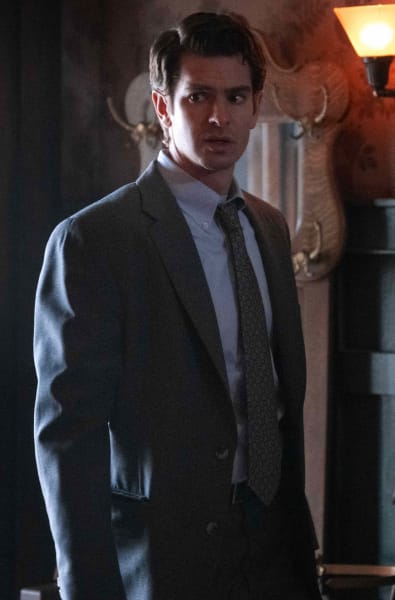The history of the world is filled with predatory men who will go to great lengths to justify abusing and oppressing women and girls.
On Under the Banner of Heaven Season 1 Episode 5, things get bleak for all the women involved, and the truth about Ron is revealed.
It’s the running theme of a story that keeps losing its focus.
Even though this episode is about Ron and Dan, their wives are far more compelling characters. These women are brutalized by their husbands, psychologically tortured in Matilda’s case, and physically brutalized in Dianna’s case.
Jeb’s meeting with the Bishop and his wife reveals that these women were of little consequence to the church, possibly because they were both outsiders and forgotten by their families either due to distance or because they had written her off for “joining a cult.”
Chloe Pirrie handles Matilda’s resigned courage gracefully, making us feel the disgust and resignation with her husband and then forcing her to sacrifice her own safety for her daughters. She should not have had to do that.
The more wives we marry, the more children we sire, and the greater the glory in worlds without end.
Dan Lafferty
It shows that religion will back women into a corner and bend them until they break, but a mother will fight for her children even at the cost of her freedom.
Then, Dianna (Denise Gough) took the brunt of Ron’s force but refused to let him take her children. Ron was the unhinged one at that moment, while Dianna was a woman who had been pushed to her limit and abandoned by her support network.
Ron’s “descent” in our estimation is telling. The testimony from his brothers built him up as a stoic pillar, but they were unreliable narrators, and it was not the truth. He was a vicious monster when it came down to it — just like his father.
As luminous as Tyner Rushing is as Emma Smith, it still feels off that there is so little of Daisy Edgar-Jones as Brenda. Despite top-billing, Edgar-Jones is barely in the show, relegated to a passing mention here and there.
If Dustin Lance Black wanted to do a critical retelling of the history of Mormonism from Emma Smith’s point of view, I would have been all for it. It might have been a harder sell for networks, though. It feels like it’s being shoehorned in, thereby squeezing Brenda Lafferty out of her own story.
Brother, our greatest loss can be traced back to words written by a wife who thought she knew better than her husband.
Bernard Brady
It’s important to bring this sinister crime to light so that people know the dangers of fundamentalism and the cultish nature of some religions. The war on women in the US is no joke.
It’s not just Brenda and Erica, Dianna, Matilda, Cora, Eilidh, the women from Bountiful (Canada is not exempt from this either) — there are millions of them.
But where is their agency? It’s tiring to keep hearing and seeing stories about women’s suffering that focus more on the men who torment, assault, murder, save, and avenge them.
This is no slight on Andrew Garfield or Gil Birmingham, for that matter. Their dynamic is consistently rich and satisfying. But maybe Pyre and Taba could have had their own story (True Detective Season 4, anyone?).
Detective Jeb Pyre: It’s a nice neighborhood up in the hills. Closer to the Lord, they say.
Detective Bill Taba: It’s the nice neighborhoods that worry me the most.
Why not give Taba some more profound development and let the two of them solve some fictional crimes — they are fictional characters in this real-life story, after all — while Pyre the Mormon cop has a crisis of faith. Why do we have to put this on Brenda Lafferty’s story?
Even Brenda’s husband, Allen, is starting to feel sidelined here when he should be pivotal as it’s becoming increasingly likely that his brothers were behind his wife and daughter’s murders.
It’s not that the men, other than Pyre, feel fully fleshed out either. Ron’s arc feels shallow and underdeveloped, which could be due to any number of things. There are still two episodes left, so we can reserve some judgment.
It is the decision of this council that you, Ron Lafferty, be excommunicated. But know that with repentance comes the healing waters of re-baptism.
Stake President Stowe
Dan, of course, is pure evil, the kind of character we’re meant to hate. He represents the worst of humanity, the slimy manipulator who wants to have sex with his stepdaughters.
Transitions here are clunkier and increasingly scattered. Again, this may be a deliberate choice, but it makes the whole thing feel unfocused.
I know true crime doesn’t wrap up nicely, but we’re getting Lovecraft-level layers of cluttered storytelling. For instance, Jeb is in his home, remembering a conversation he had with Allen, who told him a story about Emma Smith, which we then see played out. It’s unnecessarily complex.
One clever storytelling element was when Sam quoted prophet John Taylor, and then John Taylor himself appeared as a character throughout the episode in the Joseph Smith flashbacks.
The final sequence had flashes of brilliance, but there was too much going to truly convey the weight of any of the events being portrayed. The reveal that Ron believes himself to be the One True Prophet doesn’t feel earned.
Let it be a reminder — sometimes the closer we are to Heavenly Father, the more we are going to be persecuted.
Ron Lafferty
This over-editing is ambitious and could work, but it muddles the themes. Under The Banner Of Heaven wants to be too many things and doesn’t trust the central story it’s trying to tell. It doesn’t seem to know what it’s trying to say other than “fundamentalism is bad.”
It will need a clear focus going into the last two episodes in order to make a lasting impact. For a television show, there’s a lot more “telling” than “showing” as a narrative device.
This show has all the elements of a gripping story, but the pace has never really ramped up, apart from the nail-biting first third of Under The Banner Of Heaven Season 1 Episode 3.
What will be the lasting impact of Under The Banner Of Heaven? Will it simply anger the Mormons (even though they have a sympathetic Mormon protagonist)? Probably.
Will it give Brenda’s real-life family some sense of justice or closure? It seems unlikely.
Will it bring awareness to the suffering of countless women trapped in these cults — past and present — and work towards abolishing this abhorrent treatment in the future? That’s a good-faith maybe, at best.
I will remove your family, past and future, from the kingdom of Heaven. I will cast the dust from my feet and curse you for all eternity unless you show me the respect Heavenly Father demands.
Sam Lafferty
The problem is not just the men who do these horrible things, but the systems that hold them up, protect them, and help perpetuate the cycles of violence.
Is knowledge enough to move people to action? Or are we all trapped in this cycle?
Look around. It’s grim as it ever was, and if that’s the point Under The Banner Of Heaven is trying to make, it’s one of many stories that have already tread similar ground.
What do you think of this particular story and how it is being told? Share your thoughts in the comments.
Mary Littlejohn is a staff writer for TV Fanatic. Follow her on Twitter.

